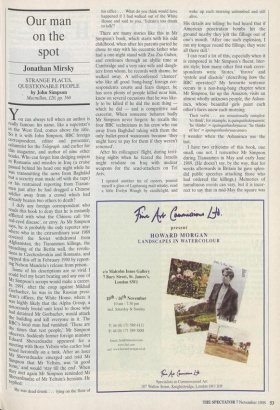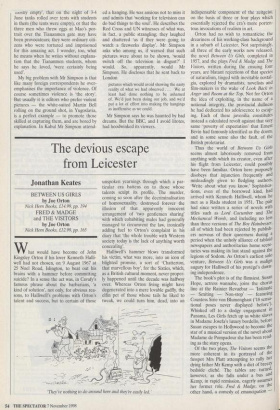Our man on the spot
Jonathan Mirsky
STRANGE PLACES, QUESTIONABLE PEOPLE by John Simpson Macmillan, .E20, pp. 560 You can always tell when an author is really famous: his name, like a superstar's in the West End, comes above the title. So it is with John Simpson, BBC foreign correspondent, editor and presenter, columnist for the Telegraph and earlier for this magazine, and author of nine other books. Who can forget him dodging snipers In Romania and missiles in Iraq (a cruise Passed behind his head one night while he was transmitting the news from Baghdad but a security man made off with the tape) or his restrained reporting from Tianan- Inen just after he had dragged a Chinese soldier away from a crowd which had already beaten two others to death? I defy any foreign correspondent who reads this book to deny that he is instantly afflicted with what the Chinese call 'the red-eyed disease', or envy. As Mr Simpson says, he is probably the only reporter any- where who in the extraordinary year 1989 covered the Soviet withdrawal from Afghanistan, the Tiananmen killings, the breaching of the Berlin wall, the revolu- tions in Czechoslovakia and Romania, and t.oPped this off in February 1990 by report- ing Nelson Mandela's release from prison. Some of his descriptions are so vivid I .t?.111d feel my heart beating and any one of ;rvir Simpson's scoops would make a career. 41 1991, after the coup against Mikhail Gorbachev, he was in the Russian presi- dent's offices, the White House, where it was highly likely that the Alpha Group, a notoriously brutal unit loyal to those who had detained Mr Gorbachev, would attack the building and kill everyone in it. The 813C's local man had vanished. 'These are the tunes that test people,' Mr Simpson observes. Suddenly former foreign minister Eduard Shevardnadze appeared for a Meeting with Boris Yeltsin who earlier had nood heroically on a tank. After an hour om.r Shevardnadze emerged and told Mr plipson that Mr Yeltsin, was 'in good Trul,' and would 'stay till the end'. When c',u,cy met again Mr Simpson reminded Mr '3nevardnadze of Mr Yeltsin's heroism. He replied:
He was dead drunk . . . lying on the floor of
his office .. . What do you think would have happened if I had walked out of the White House and said to you, `Yeltsin's too drunk to talk'?
There are many stories like this in Mr Simpson's book, which starts with his odd childhood, when after his parents parted he chose to stay with his eccentric father who had a one-night stand with Zsa Zsa Gabor, and continues through an idyllic time at Cambridge and a very nice wife and daugh- ters from whom, he records with shame, he walked away. A self-confessed `chancer' who like all good tang-bang' foreign cor- respondents courts and fears danger, he has seen plenty of people killed near him, knew on several occasions that he was like- ly to be killed if he did the next thing — which he did — and is competitive and careerist. When someone behaves badly Mr Simpson never forgets: he recalls the four BBC technicians in his crew who ran away from Baghdad taking with them the only bullet-proof waistcoats because 'they might have to pay for them if they weren't returned'.
After his colleagues' flight, during terri- fying nights when he feared the Israelis might retaliate on Iraq with nuclear weapons for the scud-attackers on Tel Aviv, I opened another tin of oysters, poured myself a glass of Laphroaig malt whisky, read a little Evelyn Waugh by candlelight, and
woke up each morning unbombed and still alive.
His details are telling: he had heard that if American penetration bombs hit the ground nearby they jolt the fillings out of one's mouth. 'After one such explosion, I ran my tongue round the fillings; they were all there still.'
I can read a lot of this, especially when it is composed in Mr Simpson's fluent, liter- ate style; how many other first-rank corre- spondents write 'litotes,' throve' and 'systole and diastole' (describing how the BBC operates)? My favourite sentence occurs in a non-bang-bang chapter when Mr Simpson, far up the Amazon, visits an almost wholly unknown people, the Ashan- inca, whose beautiful girls paint each other's faces anew each morning: Their verbs . . . are sensationally complex: 'to think', for example, is quinquithshityaantsi; 'he thinks' = iquinquithashayaaca; 'he thinks of her' = iquinquithashayaacanaro.
I wonder when the Ashaninca use the last.
I have two criticisms of this book, one small, one not. I remember Mr Simpson during Tiananmen in May and early June 1989. (He doesn't say, by the way, that for weeks afterwards in Britain he gave splen- did public speeches attacking those who had ordered the killings.) Memories of tumultuous events can vary, but it is incor- rect to say that in mid-May the square was mostly empty', that on the night of 3-4 June tanks rolled over tents with students in them (the tents were empty), or that the three men who threw eggs at Mao's por- trait over the Tiananmen gate may have been provocateurs; they were ordinary citi- zens who were tortured and imprisoned for this amazing act. I wonder, too, what he means when he writes without explana- tion that the Tiananmen students, whom he says he loved, 'were certainly being used'.
My big problem with Mr Simpson is that like many foreign correspondents he over- emphasises the importance of violence. Of course sometimes violence is 'the story'. But usually it is editors who prefer violent pictures — the white-suited Martin Bell rolling on the ground shot, in Yugoslavia, is a perfect example — to promote those skilled at capturing them, and are bored by explanation. In Kabul Mr Simpson attend- ed a hanging. He was anxious not to miss it and admits that 'working for television can do bad things to the soul'. He describes the Red Cross and UN witnesses of what was, in fact, a public strangling; they laughed and chattered 'as if they were going to watch a fireworks display'. Mr Simpson asks who among us, if warned that such pictures were about to be shown, 'would switch off the television in disgust?' I would. So, apparently, would Mr Simpson. He discloses that he sent back to London
pictures which would avoid showing the nasty reality of what we had observed .. . We at least had done nothing to be ashamed of. We'd just been doing our job, and we'd put a lot of effort into making the hangings as inoffensive as we could.
Mr Simpson says he was haunted by bad dreams. But the BBC, and I avoid litotes, had hoodwinked its viewers.



















































































 Previous page
Previous page